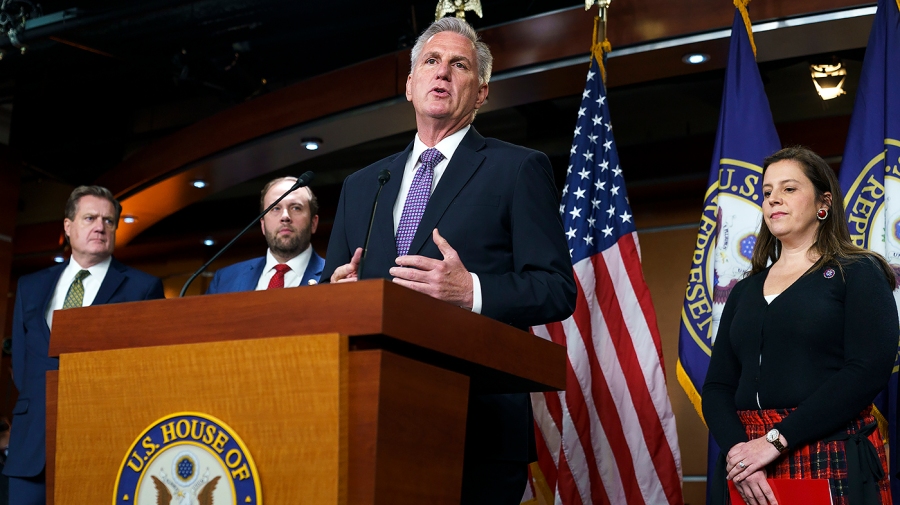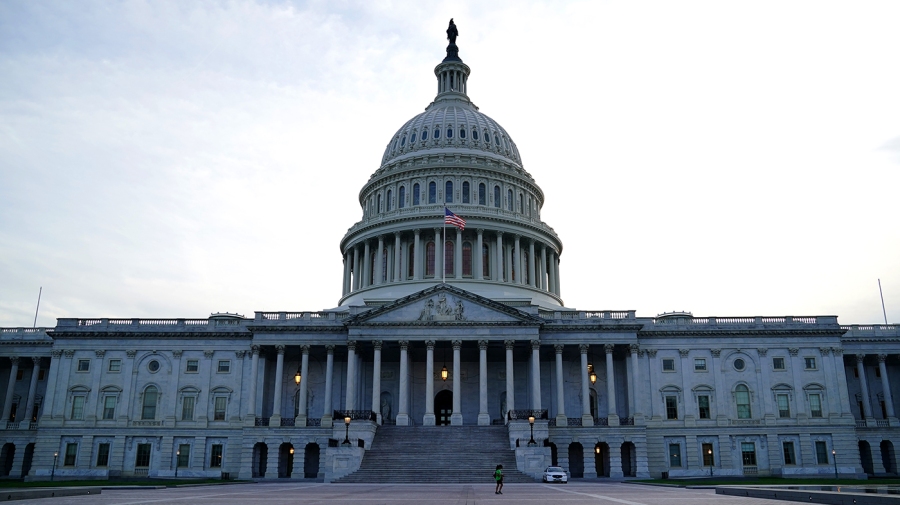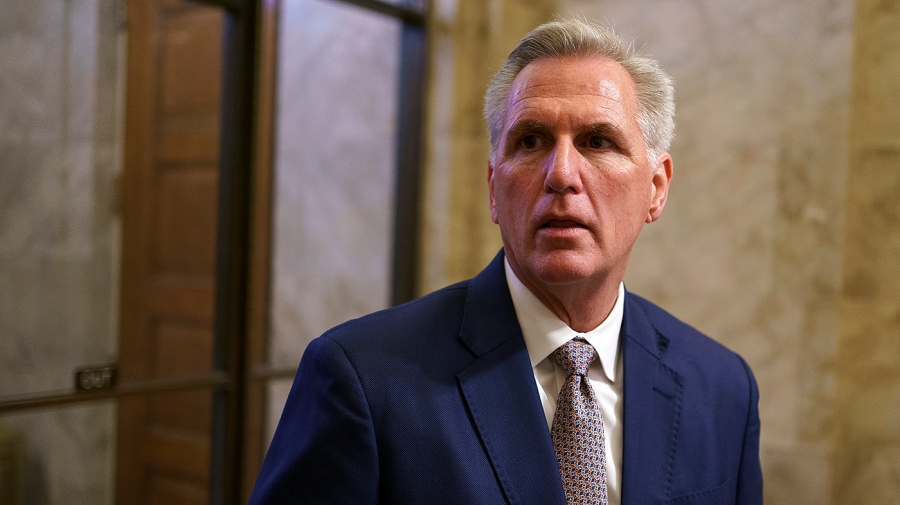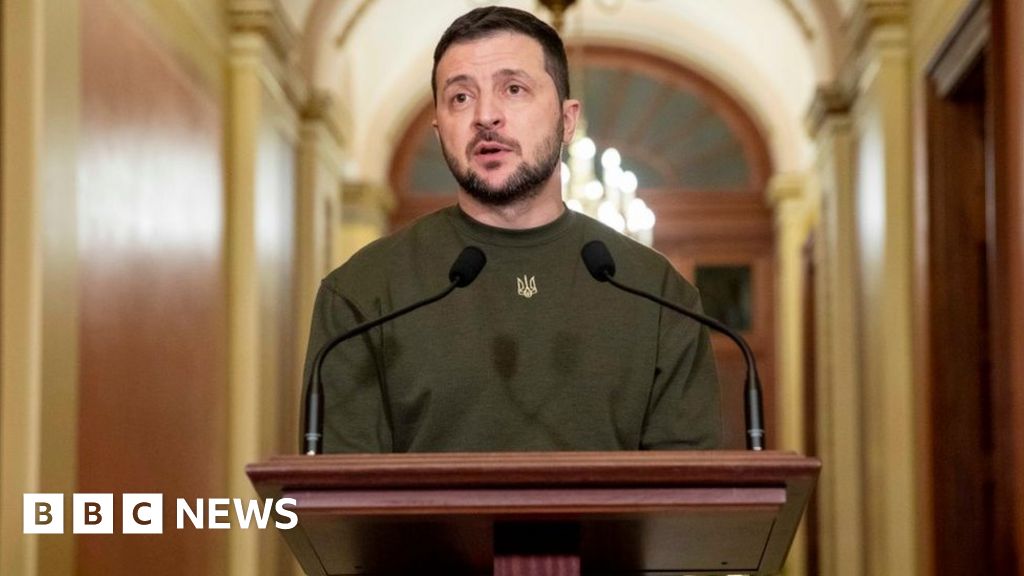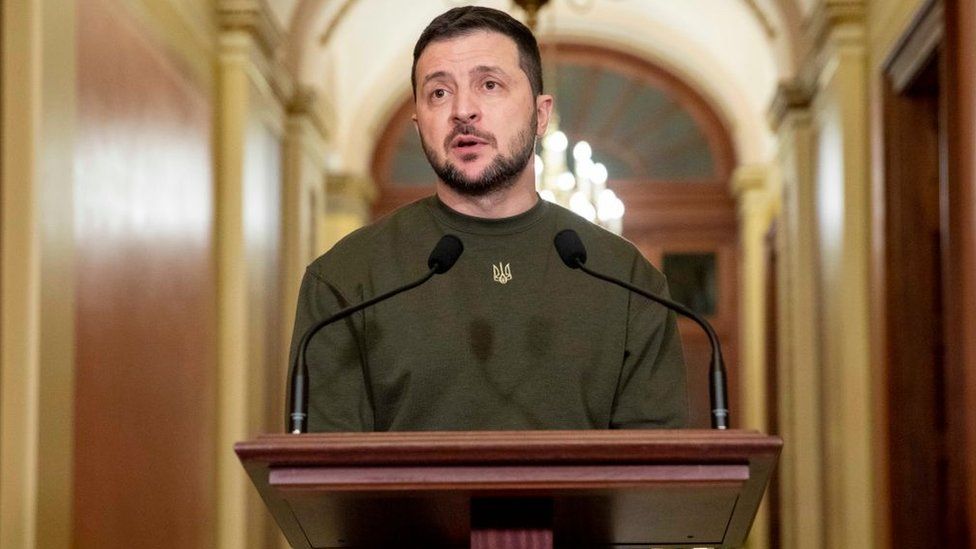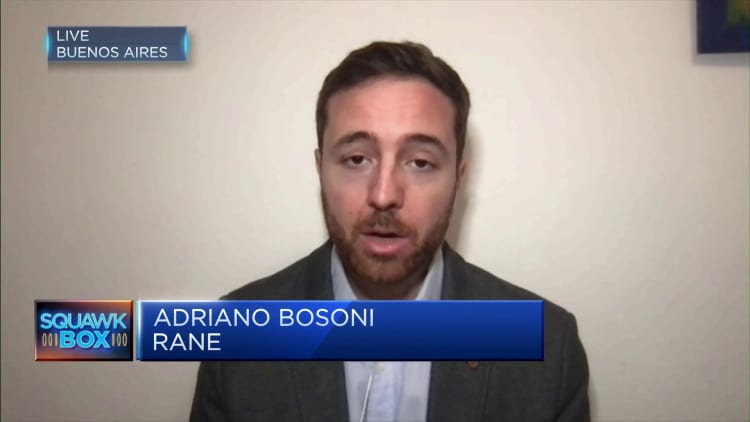Just In | The Hill
Opposition to House GOP Leader Kevin McCarthy (Calif.) for Speaker from a handful of Republican members has the potential to derail his bid and set a marker in history as the first multiple-ballot Speaker election in a century.
No matter what happens, the day is sure to hold surprises and plenty of political drama.
Here is what to know about the process for electing a House Speaker, the math to win nthe election on the floor, what happens if there is no winner and much, much more.
Understanding McCarthy’s math problem
House Republicans’ slim majority heading into the 118th Congress is putting McCarthy in a bind.
The House has 222 incoming Republicans, 212 incoming Democrats and one vacancy left by the death of Rep. Donald McEachin (D-Va.) shortly after his reelection. The special election to fill the vacancy for the solidly Democratic seat is on Feb. 21.
A majority of the whole House is 218 votes, and five or more Republican defections would put McCarthy below that threshold.
McCarthy is in trouble because five House Republicans — Reps. Andy Biggs (Ariz.), Matt Gaetz (Fla.), Bob Good (Va.), Matt Rosendale (Mont.) and Ralph Norman (S.C.) — have explicitly said or strongly indicated they will not support McCarthy.
Several other House Republicans pushing for rules changes that would empower rank-and-file members have withheld support for McCarthy without explicitly saying they will vote against him. Those members include Reps. Scott Perry (Pa.), Chip Roy (Texas) and Lauren Boebert (Colo.).
When the House GOP conference nominated McCarthy to be Speaker in November, 36 members did not vote for him. Biggs has said he thinks there are around 20 “hard noes” on McCarthy.
All Democrats are expected to vote for incoming House Minority Leader Hakeem Jeffries (D-N.Y.) for Speaker — at least on the first ballot.
It is possible to elect a Speaker with fewer than 218 votes. Speaker Nancy Pelosi (D-Calif.) and former Speaker John Boehner (R-Ohio) were elected with 216 votes in 2021 and 2015, respectively.
Current House practice dictates that the Speaker must be elected by a majority of those voting for a specific Speaker candidate by surname. Vacancies, absences and “present” votes lower that threshold.
Unexpected absences due to illness, weather or other circumstances, then, could affect McCarthy’s math.
Theoretically, some McCarthy opponents could vote “present” rather than for an alternative candidate in order to express opposition without jeopardizing McCarthy’s path to the gavel.
For instance, if 216 Republicans vote for McCarthy, 212 vote for Jeffries, two Republicans vote for other candidates and four vote “present,” McCarthy would be elected Speaker with a majority of all those voting for a candidate.
But the five most vocal McCarthy opponents have forecasted that they will not vote “present” — keeping McCarthy’s bid in further danger.
The schedule for Jan. 3 and the Speaker’s vote
The House is expected to conduct some housekeeping business for the tail end of the 117th Congress on the morning of Jan. 3 before it officially concludes sine die.
Then at noon on Jan. 3, the constitutionally designated start of every congressional session, the House will start the 118th Congress.
After a call to order by the House clerk, a prayer and the Pledge of Allegiance, the clerk will order a quorum call — the first roll call action of the 118th Congress.
The next order of business will be electing the House Speaker. Typically, one leader from each party will give nominating speeches for each party nominee.
Then, the clerk takes a roll call vote, going down the list of every member of Congress who will each vocally cast a vote for Speaker. That process took around an hour for the Speakership election in 2019, before the COVID-19 pandemic.
There will be no proxy votes. Not only have Republicans pledged to do away with pandemic-era remote voting rule, that procedure can only be used if the House has not adopted a rules package — which happens after the Speaker election and members take their oaths of office. The 2021 Speaker election didn’t have proxy votes, either.
What happens if no candidate wins a majority?
If no candidate wins a majority of votes for Speaker on the first ballot, House lawmakers will vote again and again until a Speaker is elected.
In the event of multiple ballots, the House will not necessarily continue late into the night. The last time there were multiple ballots, the House adjourned until the following day after four failed ballots. Adjourning also allows members time to negotiate and strike deals.
But the House will be able to do little else. Until a Speaker is elected, it can’t adopt a rules package governing procedure in the House. For House Republicans, uncertainty about the Speaker election has led to a delay in the conference choosing contested committee chairs.
Any long delay in selecting a Speaker could also affect staff operations for the House. Politico reported that guidance sent to House committees warned that payroll cannot be processed for staff if a House rules package is not adopted by Jan. 13.
Dire circumstances could lead to unusual procedures. Twice before, in 1949 and 1956, the House agreed to a resolution that allowed a Speaker to be elected by a plurality. That move was something of a last resort, though, and came after 59 and 129 failed ballots. A majority of the whole House would need to agree to that resolution.
Multiple Speaker ballots would put a marker in history
A Speaker election has not gone to a second ballot in nearly a century and has taken multiple ballots only 14 times, with 13 of those occurring before the Civil War.
The last time, in December 1923, it took nine ballots over three days before the House elected Republican Frederick Gillett (Mass.) to a third term as Speaker.
Gillett won the Speakership after reaching an agreement with progressive Republicans that the House would consider and debate changes to the House rules — a situation not so different than the one McCarthy is facing today.
The longest Speakership election ever, in 1856, lasted two months and took 133 ballots before Rep. Nathaniel Banks (Mass.) was elected Speaker.
If not McCarthy, then who?
McCarthy allies note there is not a public viable alternative to him for Speaker and argue that his detractors are merely saber rattling to get leverage for concessions on rules and priorities.
Rep. Andy Biggs (R-Ariz.) is running as a protest challenger to McCarthy, but not even his fellow McCarthy opponents think he is a viable GOP alternative for Speaker.
McCarthy opponents have teased that there will be an alternative candidate for Speaker revealed at some point, but have declined to come together to name a consensus alternative, fearing backlash.
Rep. Steve Scalise (La.), whom Republicans elected to be House majority leader, is an obvious potential alternative to McCarthy. But Scalise is publicly backing McCarthy.
“Kevin’s going to get there, and he’s going to have a lot of meetings with members to make sure that we get this result on Jan. 3,” Scalise said before the House left for the holidays.
Rep. Jim Jordan (R-Ohio), who challenged McCarthy to lead House Republicans in 2018, is a favorite of hard-line conservative Republicans. Gaetz has pushed a “Jordan for Speaker” message in recent days. Jordan, though, has also repeatedly said he supports McCarthy.
McCarthy detractors say there is no chance that a Democrat is elected Speaker. And while it is technically possible for a nonmember to be elected House Speaker, Good recently said that notion is “practically improbable.”
Some Republicans and Democrats have also teased the possibility of working together to elect a consensus GOP Speaker. But moderate GOP Rep. Don Bacon (Neb.) says he will only entertain that if McCarthy drops out of the race.
Arguments for and against McCarthy
Supporters of McCarthy argue that he has earned the position after leading House Republicans back to the majority through gains in both the 2020 and 2022 elections. They praise his “Commitment to America” plan for a GOP majority.
Rep. Marjorie Taylor Greene (R-Ga.), who has emerged as one of the most vocal McCarthy supporters, has also warned that any GOP alternative to McCarthy could be less conservative and give less leeway for hard-line conservatives like herself.
They also criticize any delays in House GOP oversight activities and worry about the precedent of denying their party leader for the past four years the post.
“If you can put all that work and dedicate your life and sacrifice your time, yourself, your family, only in the eleventh hour to have a knife in your back, nobody’s ever going to do that work again. It would set the worst precedent I can imagine politically,” Rep. Brian Fitzpatrick (R-Pa.) told The Hill in December.
But those opposed to McCarthy or withholding support for him argue that smaller-than-expected gains in the 2022 midterms should not be rewarded. They are pushing McCarthy to take even stronger stances and tactics against Democrats and the Biden administration, want a plan to balance the federal budget and favor rules changes that would empower individual members, among other demands.
Boebert recently said her “red line” for support is restoring any member’s ability to make a “motion to vacate the chair,” a move to force a vote on ousting the Speaker.
McCarthy over the weekend made a key concession on the point and lowered the threshold to five GOP members to make a move to vacate, down from a standard of a majority of the conference. But McCarthy critics have signaled that standard, along with his response on other measures, is not good enough.
House, News, Andy Biggs, Bob Good, Donald McEachin, John Boehner, Kevin McCarthy, Matt Gaetz, Nancy Pelosi, Speaker's election Read More


